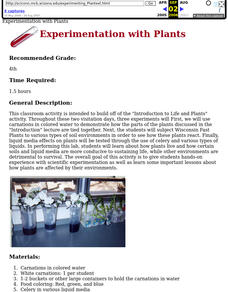Curated OER
Pond Water Web
Students familiarize themselves with the common organisms that live in a pond and discover their importance in a balanced aquatic habitat as they create food webs. They also investigate how an environmental change affects the habitat as...
Curated OER
"Four" Goodness Sake
Fourth graders recognize that ethnicity, religion and geography are reflected in the food choices we make. In this food choices lesson, 4th graders discuss different types of food from different places. Students compare a menu to the...
Curated OER
Rainbow Electrophoresis Lab
Students are introduced to the principles of gel electrophoresis. They practice loading gels and pipetting. In this laboratory activity, food color is separated into constituent pigments. The lab can be run with standard electrophoresis...
Curated OER
The Magic School Bus Dries Up
Students learn along with Ms. Frizzle's class. In this Magic School Bus lesson plan, students work in small groups to find out if foods they eat contain water.
Curated OER
Monstrous Mutations
Students investigate mutations and simulate their mutation while trying to collect food. In this mutations lesson plan, students pick an identified mutation out of a paper bag. They simulate their mutation while trying to collect food...
Curated OER
Basic Vitamins: Water-Soluble and Fat-Soluble
Students examine vitamins and study their functions and food sources. They research what happens to vitamins when foods are overcooked. They prepare a microwaveable vegetable quiche.
Curated OER
Bird Bodies
Students read about and explore the different types of birds. They discuss how all birds are alike and what makes some different from the others. They experiment picking up "food items" using different tools that represent different...
Curated OER
Dino-Mite Web Quest
In this science worksheet, students identify a specific dinosaur to research. Then they develop an overview of their dinosaur family and the foods each dinosaur in their family eat. Students also identify how the dinosaurs defend...
Curated OER
Principles of Ecology
In this ecology worksheet, students will review 10 vocabulary words associated with the basic principles of ecology. This worksheet has 10 fill in the blank questions.
Curated OER
What The Peanuts Say: Catabolism and Calories
Students investigate the energy released by a peanut and a piece of a walnut. In this catabolism and calories lesson plan, students burn a peanut and a piece of a walnut and measure the temperature of the water before burning and after...
Curated OER
Cancer
Students study cancer and possible preventative measures. In this cancer lesson students study the claims on food labels and ways to lower your risk of cancer.
Curated OER
Got Plants
Second graders discover that all living things need food in order to live. In groups, they examine the interconnectedness between animals and plants. They identify which animals eat plants to survive and which animals eat animals that...
Curated OER
So You Think You're Tough
Fourth graders learn how to classify animals. In this invertebrates lesson, 4th graders discuss how we classify thinks into groups and move into a discussion about classifying animals. Students learn about the differences between...
Curated OER
Salmon Life Cycles
Students list salmon life cycle stages in order, list three threats that salmon face throughout their lives, and examine important role native fish play in aquatic food chains throughout their life cycles.
Curated OER
Changing Climate, Changing Animals
Young scholars review teacher-provided background materials on impact of climate change. Students then work in small groups to make poster on possible impacts of climate change on one particular northern animal, and how it might affect...
Curated OER
Who Eats Whom in the Salt Marsh?
Seventh graders complete a virtual online salt marsh tour. In groups, they observe and identify the various types of animals found in the marsh. After categorizing the animals, they create a food web based on the animals role in the...
Curated OER
Marshland Ecosystems
Students identify animals in ecosystem depicted on 16th Century ceramic basin and classify them as herbivores, carnivores, or omnivores based on physical characteristics and prior knowledge, determine which life forms in ecosystem are...
Curated OER
Photosynthesis Cookies
Students identify photosynthesis as a process through which organisms make their own food. They practice the process for writing the formula for the photosynthesis equation.
Students describe how the processes of photosynthesis and...
Curated OER
Experimentation With Plants
Fourth graders experiment with different varieties of plants and draw conclusions after performing a series of lab activities. A very helpful student worksheet is given. This is a nicely done introductory lesson plan for life science.
Curated OER
The Circle of Life
Fourth graders examine how the different organisms living in an ecosystem affect one another. In groups, they research a specific ecosystem and present their findings to the class based on the type of organisms found in it. To end the...
Curated OER
What Animals Need to Live
Fourth graders read "Habitat: What Animals Need to Live" then create a Venn diagram for herbivore, omnivore, and carnivore. In this animal survival lesson plan, 4th graders determine where different animals need to live depending on what...
Curated OER
Mixing Colors
Students understand why we see various colors. In this mixing colors instructional activity, students experiment with different food coloring to explore how colors are made. Students record on a data sheet the colors they see.
Curated OER
Animals of the Fire Ice
Students examine ocean life by identifying methane hydrates. In this ocean life lesson, students research organisms that live in the coldest, deepest parts of the ocean and live off methane hydrates. Students create a group...
Curated OER
Industrialization
Eleventh graders examine government regulations. In this industrialization lesson, 11th graders look into what was going on inside American factories during the era. Students read excerpts of The Jungle and watch selected video clips...

























